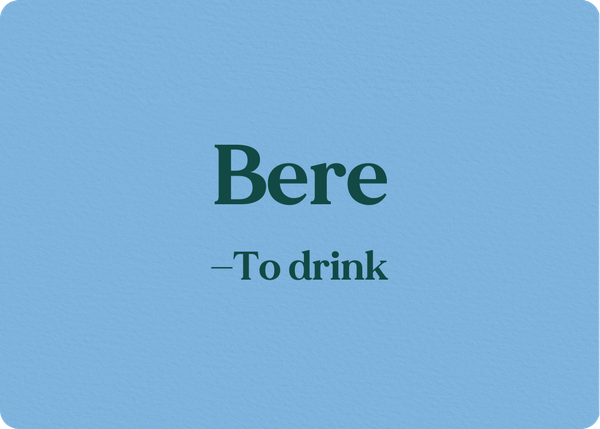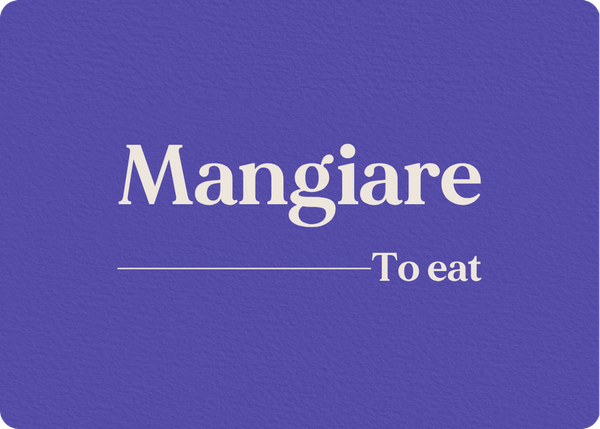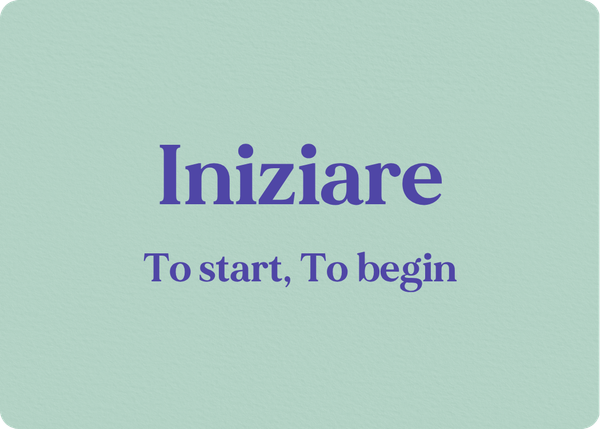What is Bere?
Bere is one of the most irregular and essential Italian verbs meaning "to drink", "to consume liquids", "to have a beverage". It belongs to the second conjugation (-ERE verbs) but is highly irregular in many tenses. This verb is useful for expressing ordering drinks, discussing meals, and describing social activities.
Key Features of Bere:
- Type: Irregular second conjugation verb (-ERE).
- Meaning: To drink, to consume liquids, to have a beverage
- Irregularities: Present tense (bevo), imperfect (bevevo), simple past (bevvi, etc.), future (berrò), present subjunctive (beva), conditional (berrei), imperative (bevi), past participle (bevuto), gerund (bevendo)
- Auxiliary verb: Uses "avere" (to have) for conjugation in compound tenses
- Past participle: Bevuto
Indicativo – Indicative Mood
Presente (Present Tense)
| Person | Conjugation |
|---|---|
| io | bevo |
| tu | bevi |
| lui/lei | beve |
| noi | beviamo |
| voi | bevete |
| loro | bevono |
Example:
Bevo il cappuccino ogni mattina.
I drink cappuccino every morning.
Passato Prossimo (Present Perfect)
| Person | Conjugation |
|---|---|
| io | ho bevuto |
| tu | hai bevuto |
| lui/lei | ha bevuto |
| noi | abbiamo bevuto |
| voi | avete bevuto |
| loro | hanno bevuto |
Example:
Io e Michela abbiamo bevuto una cioccolata calda insieme ieri.
Michela and I drank a hot chocolate together yesterday.
Imperfetto (Imperfect)
| Person | Conjugation |
|---|---|
| io | bevevo |
| tu | bevevi |
| lui/lei | beveva |
| noi | bevevamo |
| voi | bevevate |
| loro | bevevano |
Example:
Da bambino bevevo sempre il latte a colazione.
As a child, I always used to drink milk at breakfast.
Trapassato Prossimo (Past Perfect)
| Person | Conjugation |
|---|---|
| io | avevo bevuto |
| tu | avevi bevuto |
| lui/lei | aveva bevuto |
| noi | avevamo bevuto |
| voi | avevate bevuto |
| loro | avevano bevuto |
Example:
Non riuscivo a dormire perché avevo bevuto troppi caffè.
I couldn't sleep because I had drunk too many coffees.
Passato Remoto (Simple Past)
| Person | Conjugation |
|---|---|
| io | bevvi/bevei/bevetti |
| tu | bevesti |
| lui/lei | bevve/bevé/bevette |
| noi | bevemmo |
| voi | beveste |
| loro | bevvero/beverono/bevettero |
Example:
Durante quella festa bevvi solo acqua.
At that party, I only drank water.
Trapassato Remoto (Past Anterior)
| Person | Conjugation |
|---|---|
| io | ebbi bevuto |
| tu | avesti bevuto |
| lui/lei | ebbe bevuto |
| noi | avemmo bevuto |
| voi | aveste bevuto |
| loro | ebbero bevuto |
Example:
Ripresero il cammino, dopo che ebbero bevuto alla fonte.
They resumed their journey when they had drunk from the spring.
Futuro Semplice (Simple Future)
| Person | Conjugation |
|---|---|
| io | berrò |
| tu | berrai |
| lui/lei | berrà |
| noi | berremo |
| voi | berrete |
| loro | berranno |
Example:
Dopo la passeggiata berremo una limonata fresca.
After the walk we will drink a fresh lemonade.
Futuro Anteriore (Future Perfect)
| Person | Conjugation |
|---|---|
| io | avrò bevuto |
| tu | avrai bevuto |
| lui/lei | avrà bevuto |
| noi | avremo bevuto |
| voi | avrete bevuto |
| loro | avranno bevuto |
Example:
Oggi avrò bevuto due litri d'acqua!
Today I will have drunk two liters of water!
Congiuntivo – Subjunctive Mood
Presente (Present Subjunctive)
| Person | Conjugation |
|---|---|
| che io | beva |
| che tu | beva |
| che lui/lei | beva |
| che noi | beviamo |
| che voi | beviate |
| che loro | bevano |
Example:
Mi sembra che Antonio beva l'acqua frizzante.
It seems to me that Antonio drinks sparkling water.
Passato (Past Subjunctive)
| Person | Conjugation |
|---|---|
| che io | abbia bevuto |
| che tu | abbia bevuto |
| che lui/lei | abbia bevuto |
| che noi | abbiamo bevuto |
| che voi | abbiate bevuto |
| che loro | abbiano bevuto |
Example:
Penso che io non abbia mai bevuto un liquore così buono!
I think I have never drunk such a good liqueur!
Imperfetto (Imperfect Subjunctive)
| Person | Conjugation |
|---|---|
| che io | bevessi |
| che tu | bevessi |
| che lui/lei | bevesse |
| che noi | bevessimo |
| che voi | beveste |
| che loro | bevessero |
Example:
Il medico voleva che io bevessi meno bibite gassate.
The doctor wanted me to drink fewer carbonated drinks.
Trapassato (Past Perfect Subjunctive)
| Person | Conjugation |
|---|---|
| che io | avessi bevuto |
| che tu | avessi bevuto |
| che lui/lei | avesse bevuto |
| che noi | avessimo bevuto |
| che voi | aveste bevuto |
| che loro | avessero bevuto |
Example:
Se avessero bevuto più lentamente, non avrebbero avuto mal di stomaco.
If they had drunk more slowly, they wouldn’t have had a stomachache.
Condizionale – Conditional Mood
Presente (Present Conditional)
| Person | Conjugation |
|---|---|
| io | berrei |
| tu | berresti |
| lui/lei | berrebbe |
| noi | berremmo |
| voi | berreste |
| loro | berrebbero |
Example:
Berrei volentieri un bicchiere di quel vino rosso.
I would gladly drink a glass of that red wine.
Passato (Past Conditional)
| Person | Conjugation |
|---|---|
| io | avrei bevuto |
| tu | avresti bevuto |
| lui/lei | avrebbe bevuto |
| noi | avremmo bevuto |
| voi | avreste bevuto |
| loro | avrebbero bevuto |
Example:
Avremmo bevuto qualcosa di fresco, se il bar fosse stato aperto.
We would have drunk something fresh, if the bar had been open.
Imperativo (Imperative)
| Person | Conjugation |
|---|---|
| (tu) | bevi |
| (lui/lei) | beva |
| (noi) | beviamo |
| (voi) | bevete |
| (loro) | bevano |
Example:
Bevi molta acqua quando fa caldo!
Drink lots of water when it's hot!
Indefinite Moods
Infinito (Infinitive)
- Presente (Present): bere (to drink)
- Passato (Past): avere bevuto (to have drunk)
Examples:
Mi piace bere il tè verde.
I like to drink green tea.
Non posso negare di aver(e) bevuto troppo ieri sera.
I can't deny having drunk too much last night.
Participio (Participle)
- Passato (Past): bevuto (drunk)
Examples:
Hai bevuto la spremuta che ti ho preparato?
Did you drink the fresh juice that I prepared for you?
Gerundio (Gerund)
- Presente (Present): bevendo (drinking)
- Passato (Past): avendo bevuto (having drunk)
Examples:
Bevendo il primo sorso di vino, il sommelier ne rilevò immediatamente la qualità.
Drinking the first sip of wine, the sommelier immediately detected its quality.
Avendo bevuto troppi caffè, non riesco a dormire.
Having drunk too many coffees, I can't sleep.
The verb Bere at a glance: Key tenses you need
| Present | Present Perfect | Imperfect | Present Subjunctive | Imperfect Subjunctive | Present Conditional |
|---|---|---|---|---|---|
| io bevo | io ho bevuto | io bevevo | che io beva | che io bevessi | io berrei |
| tu bevi | tu hai bevuto | tu bevevi | che tu beva | che tu bevessi | tu berresti |
| lui/lei beve | lui/lei ha bevuto | lui/lei beveva | che lui/lei beva | che lui/lei bevesse | lui/lei berrebbe |
| noi beviamo | noi abbiamo bevuto | noi bevevamo | che noi beviamo | che noi bevessimo | noi berremmo |
| voi bevete | voi avete bevuto | voi bevevate | che voi beviate | che voi beveste | voi berreste |
| loro bevono | loro hanno bevuto | loro bevevano | che loro bevano | che loro bevessero | loro berrebbero |
Conclusion
Mastering the conjugation of "bere" is essential for expressing drinking and consumption in Italian. This irregular verb requires memorization of its unique forms, especially the present tense stem "bev-" and the irregular future/conditional stems "berr-".
Remember the key points:
- Uses "avere" as auxiliary verb
- Past participle is "bevuto"
- The stems changes: bev- (in the majority of tenses), berr- (future/conditional)
- Essential for describing drinking activities, liquid consumption, and beverage preferences
Keep practicing with real sentences and you'll master this fundamental Italian verb for expressing all drinking-related activities!





